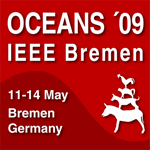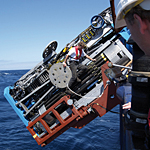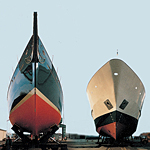Statement Prof. Rene Garello held at the OCEANS`09 media conference, May 12th, 2009:
Development of Committee on Conference Policies (CoCoPo) and Its Evolution into Joint OCEANS Administrative Board (JOAB) - Compiled by Rene Garello
This first committee, which was named CoCoPo (Committee on Conference Policies) had four main objectives:
- Issue #1: Conference Guidelines
- Issue #2: Multiple Conferences
- Issue #3: Conference Benefits
- Issue #4: Conference Regional Support
This committee rapidly came up with answers directed to the four issues stated. It was quite clear that the conference guidelines (agreed upon in 1999) were an extremely good starting point. Nevertheless, the guideline application needed to be more stringently imposed on the local organizing committee. Indeed, in order to keep a level of continuity from conference to conference, a complete set of tools needed to be developed: in particular a permanent Technical Program Committee had to be created, a first database of conference “facts” (topics, attendees, exhibitors, …) had also to be created, a website link had to be developed, and a metric for assessing the quality of a conference had to be developed.
On the fourth issue, we have seen a growth trend in Europe raised by the prospect of hosting an OCEANS conference. New chapters have been formed: where we had only two (France, Norway) and then one when the Norwegians dissolved because no conference was granted to them, we have now 4 to 5 (with the addition of Italy, Spain, Germany and UK). In order to implemented these new concepts, CoCoPo evolved, by mid 2002 - into a new structure: JOAB for Joint Ocean Advisory (latter changed to Administrative) Board (René Garello, OES, co-chair).
This committee had at the same time, to create the tools necessary for insuring a sustainable procedure for the OCEANS conferences and to support the coming “future” ones. The first in line were the 2005 conferences. Our first goal was to select a Web contractor to assist the local committee to go all electronic (from abstract to Proceedings), but also to begin implementing all the tools for allowing a smooth transition between conferences (pertinent and mandatory documents, database, mailing lists, …). The support from JOAB is coming from a group of advisers, with a lot of experience in running OCEANS conferences and able to provide guidance on the following topics: Technical Program, Exhibit, Publicity, Finances and Website interface.
All the tools for handling the technical part of the conference were delivered in time and tested in real-life context: the OCEANS’05 conferences (Europe and Americas). Again, as general chair of Oceans’05 Europe, I can testify of the net benefit we got from this move. Apart the first step in the continuity and the corporate memory we are seeking, a substantial economy was indeed realized. For the next step weed implement a delegate registration tool in order to be able to cross-check the author’s database more easily.
In conclusion, it has been demonstrated that bringing the conference to the members or to places were potential members were living proved to be a valuable and very positive move.










